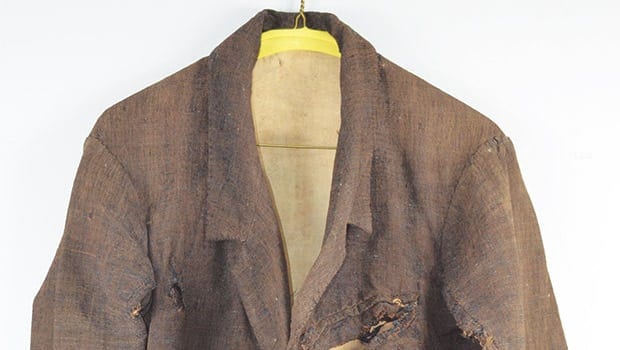Slave’s coat protected Union POW; now brothers strive to save the coat

For 81 years, an old blue coat hung in a trophy case at Gloucester High School, slowly falling into disrepair. Two 11-year-old brothers’ quest to save the artifact sent them unraveling a forgotten history that extends to the Civil War. The coat, given by a slave family to a Union prisoner of war, may have saved the soldier’s life.
In December 1864, Union soldier Albert Bacheler of the Company E of the 12th Regiment New Hampshire Infantry escaped from the infamous Libby Prison in Virginia — a Confederate facility wracked by disease, overcrowding and shortages of everything from food to blankets. As Bacheler journeyed across the countryside, he was helped by the Southern slaves who hid and sheltered him. One slave family gave him the coat to cover his Union uniform.

Author: Photo: Courtesy Museum Textile ServicesRear view of the coat.
Help save the coat
Online: https://www.youcaring.com/the-gloucester-fund-467104
Email: Gloucestercoatkids@gmail.com
Mail: Mail a check to the Gloucester fund (Civil War Coat) 45 Middle St, Gloucester, MA 01930
Saved by slaves
Most accounts of Southern slaves in the Civil War tell of them being pressed into labor for the Confederate army —building fortifications, producing crops for the troops and working in factories and army hospitals — or escaping to the North.
The coat is an emblem of another role slaves played in the Civil War that rarely is heard: active aid to Union soldiers.
“We really thought about how the slaves helped [Bacheler] was cool,” said George King, who, with his brother Charles, is running a crowd funding campaign to restore the coat. “You generally hear about slaves escaping on the underground railroad and taking shelter and they need help, but in this case it’s a POW that’s being helped by slaves.”
Bacheler eventually was discovered by an all-black Union unit, the 8th United States Colored Cavalry. After the war’s end, Bacheler hung on to the coat. He moved to Gloucester, and became principal and teacher at Gloucester High School in 1883, a position in which he would remain for 30 years. During this time, Bacheler would bring out the coat as he recounted to his students stories of the war.
“Through the use of his coat [Bacheler] taught his students compassion and determination above all odds,” wrote Adam Curcuru, District Director of Cape Ann Veteran Services, in response to the Kings’ fundraising campaign for the coat.
One of Bacheler’s students was Roger Babson, who went on to become known as an entrepreneur, businessman and philanthropist. Among his legacies is the founding of Babson College. In 1935, six years after Bacheler died, Babson donated the coat to Gloucester High School . The occasion marked the fifth anniversary of the high school’s Cadets, a program Bacheler had founded.
Forgotten history
Albert Bacheler left a mark on many parts of Gloucester in ways that often go unrecognized today, said the King brothers, grade six students at O’Malley Innovation Middle School: “There are lot of things in Gloucester that as a principal and teacher for 30 years he influenced, but nobody knows that it was him, really.”
Among them: Bacheler’s Cadets program, which, over time, evolved into the current Junior Reserve Officer Training Course. Though many in Gloucester went through JROTC, few recall its origins, the brothers said. They themselves had not known much about Bacheler before their quest to save the coat sent them exploring the city archives and local library.
As George and Charles King seek to raise money and attention for the coat, they have brought to light a piece of Gloucester and Civil War history fallen from many people’s memories.
The coat has begun to take new meaning for many who walked by it every day at the high school, George King said.
“Many people said, ‘Oh yeah, I always saw that thing when I came in,’ and then they learn about it and they actually care about it.”
Fundraising
Mold has infected the coat the slaves gave to aid Bacheler in his escape, putting the artifact at risk.
A Gloucester parent first noticed and called attention to the damage. After the issue came before the city’s Committee for the Arts, on which the boys’ mother is a member, the King brothers got involved. They have launched a crowd-funding campaign on YouCaring and seek to raise $3,500 to fix the damage to the coat, provide temporary storage and improve the mounting and display case.






